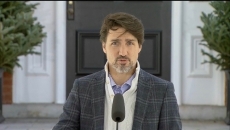The federal government appears to have relaxed restrictions at the Canada-U.S. border that would have made it impossible for first-year university students from the United States to enter the country.
An update to the government's guidance for international students, posted Friday, now says a student coming from the U.S. may no longer need a study permit that was issued on or before March 18, the day the border restrictions were first announced.
New York resident Anna Marti, whose daughter is planning to attend McGill University in Montreal this fall, said she was part of a "group effort" by parents across the U.S. who lobbied their senators, members of Congress and Richard Mills, the acting U.S. ambassador to Canada, to get the restrictions eased.
The rule would have made it all but impossible for U.S. freshmen to get into Canada, while other later-year students with pre-existing student permits could cross the border easily — even after having spent the summer south of the border, where the COVID-19 pandemic has been growing in severity for months.
Marti said she was told by Mills that the issue came up during ongoing discussions in Washington about the Canada-U.S. border restrictions — and that her entreaties, as well as media coverage of the plight of U.S. parents, "helped to put a 'face' to the issue."
Citizenship, Refugees and Immigration Canada now says border officers will accept a "port of entry letter of introduction" that shows the student was approved for a study permit, in lieu of a permit approved before March 18. The exception, however, only applies to students from the United States.
"We celebrated, although we won't fully celebrate until she is in Montreal," Marti said, noting that the family — and many others — must now wait for those letters of introduction and study permits to come through.
She's also well aware of the fact that students hoping to travel to Canada from countries outside the U.S. are still bound by the March 18 restriction.
"I just hope someone continues addressing the issue for all international freshmen," she said. "International students who quarantine are not the real danger."
Other parents in the U.S. remain wary of the border, since the rules require anyone seeking entry to Canada to be travelling for a "non-discretionary or non-optional purpose" — a description that could exclude students whose courses are being held entirely online.
The total number of COVID-19 cases in the U.S., growing by tens of thousands of cases a day, reached the 4.4 million mark Monday, with more than 150,000 deaths to date. Premature reopenings, an uneven and cavalier approach to physical distancing in parts of the country and a partisan divide over mask requirements have helped to fuel a surge in cases.
Canada, by comparison, has reported 114,000 total cases and nearly 8,900 fatalities so far.
"There are no measures in place to provide for expedited processing of study permit applications," Canada's immigration department said in an update earlier this month.
"Foreign nationals who had a study permit application approved after March 18, 2020 ... may not be exempt from the travel restrictions (and) they should not make any plans to travel to Canada until the travel restrictions are lifted, as they will not be allowed to travel to or enter Canada."
Immigration Minister Marco Mendicino announced last week the government would prioritize study permits for students who have submitted complete applications online. Students will also be able to apply time spent studying online toward their eligibility for work permits in Canada, provided at least 50 per cent of the program is completed in Canada.
Ottawa has also introduced a priority processing system and a two-stage process for students who are unable to obtain all the necessary documentation.





